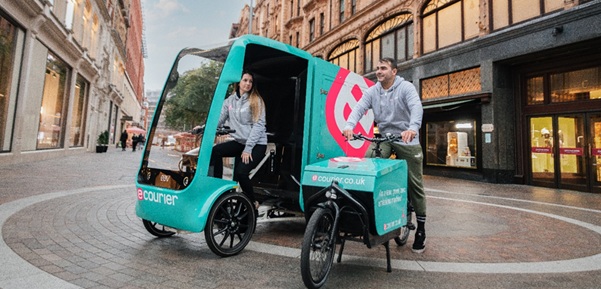
Top 10 Emerging Trends in Courier Services for 2025
The courier industry stands at a pivotal juncture, propelled by rapid technological advancements and evolving consumer expectations. As we navigate through 2025, businesses must remain informed about emerging trends to secure a competitive edge and optimise operational efficiency.
This article explores the top 10 trends poised to reshape the logistics landscape, with a particular focus on how leading UK providers like eCourier and Royal Mail are adapting.
Advanced Last-Mile Delivery Solutions:
The “last mile,” the crucial final leg of delivery, is seeing significant innovation. Technologies such as autonomous delivery vehicles and drones are being explored for their potential to enhance speed and efficiency.
AI and machine learning are also optimising delivery routes, improving speed and reducing fuel consumption – a focus for both eCourier’s advanced dispatch systems and Royal Mail’s ongoing efficiency initiatives.

The Rise of On-Demand Delivery Services:
Consumer demand for immediate and convenient deliveries is surging. Flexible models allowing customers to schedule deliveries at their convenience are becoming increasingly important. This requires a robust IT infrastructure for real-time data management and dynamic scheduling, areas where eCourier’s technological backbone excels in providing adaptable services.
Sustainable and Green Logistics:
Environmental sustainability is now a core operational imperative. Courier services are increasingly adopting green practices, including electric and hybrid vehicles, to minimise their carbon footprint. eCourier’s growing electric fleet and Royal Mail’s exploration of alternative fuels exemplify this commitment to eco-friendly operations. Investments in sustainable packaging and optimised routing further contribute to these goals.
Enhanced Tracking and Transparency:
Real-time tracking is a fundamental expectation for today’s consumers. Logistics companies are investing in advanced tracking technologies to provide precise delivery times and detailed shipment statuses. Both eCourier and Royal Mail offer comprehensive tracking services, enhancing transparency and building customer trust. Blockchain technology is also being explored for secure and immutable delivery records.

Integration of Artificial Intelligence:
AI is revolutionising logistics by enabling unprecedented insights and efficiencies. In courier services, AI algorithms can predict delivery windows, optimise routes, and manage resources effectively. By automating routine tasks, AI allows human resources to focus on more complex problem-solving, ultimately improving operational efficiency and customer satisfaction – a principle embedded in eCourier’s AI-driven logistics.
The Expansion of Same-Day Delivery Services:
The e-commerce boom has amplified the demand for swift same-day delivery. Courier companies are expanding their networks and leveraging local fulfilment centres to meet this need. eCourier specialises in providing reliable same-day delivery services, catering to urgent and time-sensitive shipments across the UK.
Collaborative and Shared Logistics:
Shared logistics models are gaining traction as companies aim to optimise resource utilisation and reduce costs. By collaborating, courier services can consolidate shipments and streamline operations. This approach enhances efficiency and minimises environmental impact by reducing the number of vehicles on the road.
The Impact of E-commerce Growth:
The continuous expansion of e-commerce is a major driver for efficient courier services. As online shopping becomes increasingly dominant, courier companies must adapt to handle larger volumes and diverse package sizes. This necessitates ongoing investment in automated sorting technologies and scalable infrastructure, areas where both eCourier and Royal Mail are continuously developing their capabilities.
Adoption of Robotics and Automation:
Automation is at the forefront of innovation in courier services, with robotics playing a growing role in sorting, packaging, and potentially even delivery. Automated systems enhance accuracy and speed, reducing human error and accelerating processing times. As efficiency becomes paramount, the adoption of robotics and automation will be crucial for maintaining a competitive edge.

Enhancing Customer Experience Through Personalisation:
Evolving customer expectations are making personalisation a key differentiator. Courier services are leveraging data analytics to tailor the customer experience, offering personalised delivery options and communication. By understanding customer preferences, companies like eCourier aim to provide a more responsive and satisfying service.
eCourier and Royal Mail: Navigating the Future of Courier Services
Both eCourier and Royal Mail are actively navigating these emerging trends to enhance their service offerings and operational efficiency.
eCourier’s technological agility and focus on specialised services, particularly same-day delivery and green logistics, position them well to capitalise on these changes.
Royal Mail, with its extensive network and long-standing reputation, is also adapting by investing in technology and exploring sustainable practices to meet the evolving demands of the market.
Conclusion
The courier industry in 2025 will be shaped by these ten key trends. By embracing innovation and adapting their strategies, courier services can enhance efficiency, improve customer satisfaction, and achieve sustainable growth in a dynamic market.
Companies like eCourier and Royal Mail are at the forefront of this evolution, demonstrating their commitment to meeting the challenges and opportunities of the future.
